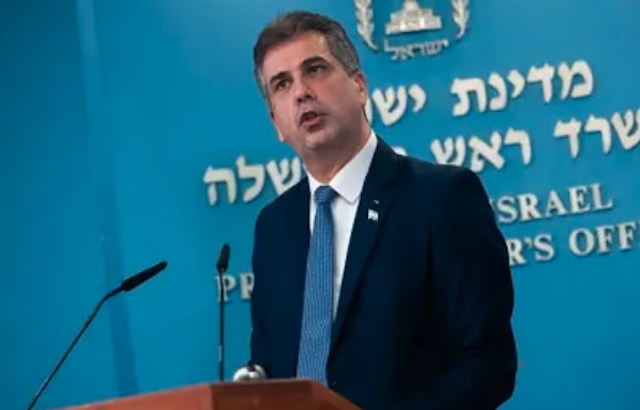In an exclusive interview conducted at the UN Headquarters in New York with Israeli Channel 12, Minister of Foreign Affairs Eli Cohen made a significant statement regarding the prospects of normalization between Israel and Saudi Arabia. Minister Cohen asserted, "After the successful normalization with Saudi Arabia, we anticipate that 6-7 more countries will follow suit." He was referring to several Arab and Muslim nations eagerly awaiting the opportunity to establish diplomatic relations with Israel. This development follows Prime Minister Netanyahu's extensive discussions regarding the ongoing negotiations with Saudi Arabia. Netanyahu candidly admitted, "We stand on the cusp of a historic peace agreement with Saudi Arabia."
Furthermore, Eli Cohen emphasized the importance of international collaboration in achieving lasting peace. He revealed, "I recently engaged in discussions with President Biden, sharing my vision for a peaceful Middle East. We both hold optimistic views on this matter. The United States plays a pivotal role in this process. Just as we successfully achieved the Abraham Accords under the leadership of President Trump, we believe that peace with Saudi Arabia can also be realized under President Biden's leadership."
נורמליזציה סביב השולחן.
— ציפי לבני Tzipi Livni (@Tzipi_Livni) September 21, 2023
עם הרב ארתור שנייר והנסיך הסעודי טורקי אל פייסל pic.twitter.com/OfBXYGw68f
Eli Cohen's statement triggered reactions from various quarters, particularly from other Muslim-majority countries. Jalil Abbas Jilani, the foreign minister in the interim Pakistani government, emphasized that Pakistan's stance on normalization with Israel hinges on the interests of the nation and the well-being of the Palestinian people. Minister Jilani reaffirmed Pakistan's support for the establishment of an independent Palestinian state.
During an interview, Minister Jilani reiterated Pakistan's position on the global stage. He renewed Pakistan's call for "the establishment of an independent Palestinian state based on the 1967 borders, with Jerusalem as its capital." His statement reflected the official stance of Pakistan, and he wasn't alone in issuing a clarification.
Murtaza Solangi, Pakistan's Minister of Information, also provided clarity on the matter. Solangi reaffirmed Pakistan's long-standing policy of not recognizing Israel and stated, "The Pakistani state and its institutions stand firmly by the Palestinian people." He stressed that Pakistan's position concerning Israel remains closely tied to the aspirations of the Palestinian people. Pakistan will maintain this stance until Palestinians secure their freedom and the right to self-determination in their homeland.
I don’t think that Pakistan’s Prime Minister Anwaarul Haq Kakar, has said anything wrong here.
— abdulbasit0344 🇵🇰🇬🇧🏴 (@abdulbasit03441) September 23, 2023
The comparison of America - Israel relations and China - Pakistan relationship seems appropriate from some angles. @anwaar_kakar pic.twitter.com/3Ka59RM9NM
Meanwhile, the process of normalization between Israel and Saudi Arabia appears to be advancing steadily. The Saudi Kingdom announced on Sunday evening its withdrawal from an old monitoring agreement with the International Atomic Energy Agency, known as the Small Quantities Protocol (SQP). This move aligns with reports indicating progress in the normalization agreement, including discussions of a broader civil nuclear program for Saudi Arabia. Additionally, the Saudi Energy Minister announced plans to construct a nuclear power plant, underscoring Saudi Arabia's commitment to cooperation with the International Atomic Energy Agency and the principle of full transparency regarding its nuclear program.


